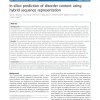Free Online Productivity Tools
i2Speak
i2Symbol
i2OCR
iTex2Img
iWeb2Print
iWeb2Shot
i2Type
iPdf2Split
iPdf2Merge
i2Bopomofo
i2Arabic
i2Style
i2Image
i2PDF
iLatex2Rtf
Sci2ools
BMCBI
2011
2011
In-silico prediction of disorder content using hybrid sequence representation
Background: Intrinsically disordered proteins play important roles in various cellular activities and their prevalence was implicated in a number of human diseases. The knowledge of the content of the intrinsic disorder in proteins is useful for a variety of studies including estimation of the abundance of disorder in protein families, classes, and complete proteomes, and for the analysis of disorder-related protein functions. The above investigations currently utilize the disorder content derived from the per-residue disorder predictions. We show that these predictions may over-or under-predict the overall amount of disorder, which motivates development of novel tools for direct and accurate sequence-based prediction of the disorder content. Results: We hypothesize that sequence-level aggregation of input information may provide more accurate content prediction when compared with the content extracted from the local window-based residue-level disorder predictors. We propose a novel p...
| Added | 24 Aug 2011 |
| Updated | 24 Aug 2011 |
| Type | Journal |
| Year | 2011 |
| Where | BMCBI |
| Authors | Marcin J. Mizianty, Tuo Zhang, Bin Xue, Yaoqi Zhou, A. Keith Dunker, Vladimir N. Uversky, Lukasz A. Kurgan |
Comments (0)

